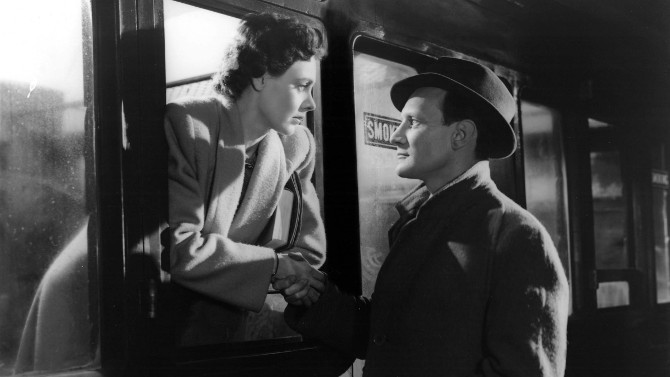
Safety First
Like a severe and utterly serious version of Stanley Kubrick’s 1964 satirical dark comedy Dr. Strangelove or: How I Learned to Stop Worrying and Love the Bomb, you would think that Fail Safe would have been the original release in theatres that was then later spoofed, yet that is not the case. Released approximately six months later in the same year, as you might imagine, it led to very poor returns at the box office – dare I say it (as the film deals with this subject matter)... it was a bomb! Despite that, over time, it has become a bonafide classic. Based upon Eugene Burdick’s 1962 novel of the same name and directed by Sidney Lumet (Dog Day Afternoon), he introduces us to our main players by way of little vignettes.
-
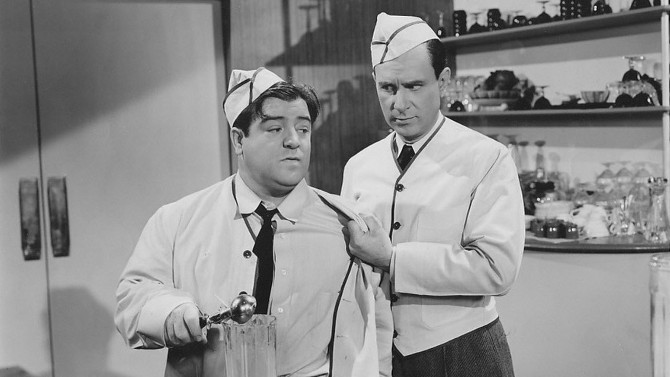
Murder at Midnight Can be Funny
Who Done It?October 30, 2016Combining a touch of horror and film noir within a murder mystery, Abbott and Costello once again add their unique brand of humour to dark subject matter in the 1942 classic comedic caper Who Done It?. Directed by Erle C. Kenton (Island of Lost Souls), this flick finds straight man Bud Abbott playing Chick Larkin while funny man Lou Costello portrays Mervin Q. Milgrim; together, they are a pair of simple-minded soda jerks on the bottom floor of a popular radio station. Yet, their true dream is to become head writers for a mystery themed radio show – which is why they took the low paying jobs in the highfalutin building. Finding writer Jimmy Turner (Patric Knowles) and secretary to the boss, Juliet Collins (Mary Wickes), in their midst while working at the soda and ice cream bar, they see this as a prime opportunity to pitch their idea. Turner takes a liking to the funny friends and invites them to a live taping of his program, Murder at Midnight.
-
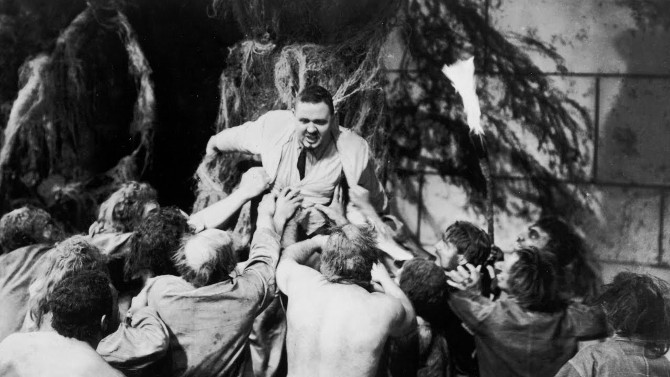
No Man is an Island
Island of Lost SoulsOctober 28, 2016Adapting H.G. Wells’ novel "The Island of Doctor Moreau" for the screen, Paramount’s 1932 film Island of Lost Souls is not nearly as well known as the Universal horror pictures that were released around the same time (Dracula, Frankenstein, The Invisible Man), though it most definitely should be. Though H.G. Wells despised the picture and its overt horror elements (which he felt got in the way of the true message of his book), it has become known as the premier adaptation of the classic novel – though it was banned three times in Britain for its depiction of vivisection. Adapted by Waldemar Young and Philip Wylie, and directed by Erle C. Kenton (The Ghost of Frankenstein, House of Frankenstein, House of Dracula), the cautionary tale follows shipwrecked survivor Edward Parker (Richard Arlen) as he is picked up by a trading vessel. Treated by a dour doctor, Montgomery (Arthur Hohl), the newly resuscitated man discovers an odd array of animals on the ship.
-
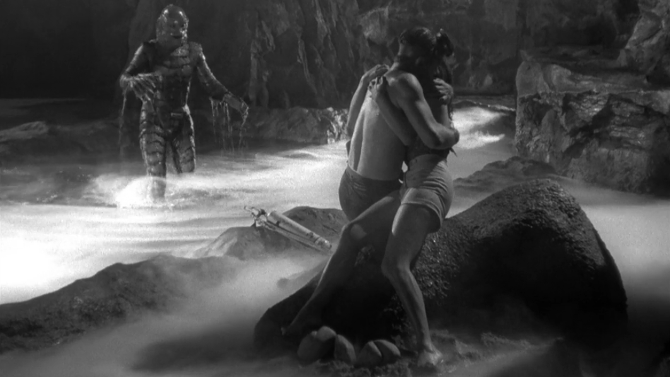
Creature Feature
Creature from the Black LagoonOctober 23, 2016The last of the great monsters to come out of Universal’s iconic horror era – that ran from the 1920s through the 1950s (following in the footsteps of Dracula, Frankenstein, The Invisible Man, The Wolf Man, as well as many others), The Creature from the Black Lagoon has captured the hearts and minds of people over the past six plus decades. Seen as being a forebear to films which have people dealing with some sort of unknown or super-animalistic type creature (think Alien, Predator or Jaws), director Jack Arnold’s 1954 horror flick developed the formula for this style of films success. Set in the heart of the Amazon, the leader of a geology expedition, Dr. Carl Maia (Antonio Moreno), stumbles upon an earthshattering discovery.
-
Star Pick with Keir Dullea
 Train in VainBrief EncounterOctober 18, 2016
Train in VainBrief EncounterOctober 18, 2016Whilst attending Trekonderoga, the Ticonderoga comic convention that is all things Star Trek, on August 13th, 2016, I was fortunate enough to be able to interview Keir Dullea. Best known for taking on the starring role of Dr. Dave Bowman in Stanley Kubrick’s iconic space epic 2001: A Space Odyssey – he reprised the character for the film’s 1984 sequel 2010: The Year We Made Contact. Dullea has played a variety of intriguing roles over his six plus decades in the industry, getting his first lead role in 1962's David and Lisa, the actor then went on to star in 1964's The Thin Red Line, Otto Preminger’s 1965 mystery Bunny Lake is Missing, 1974's Black Christmas (often considered to be the genesis of the slasher horror film genre), and Robert De Niro’s 2006 flick The Good Shepherd, to name but a few of his film credits. The man actually highlighted a small Canadian film that he made back in 1973, titled Paperback Hero (also known as Last of the Big Guns), as being the favourite film he has worked on to this point.
-
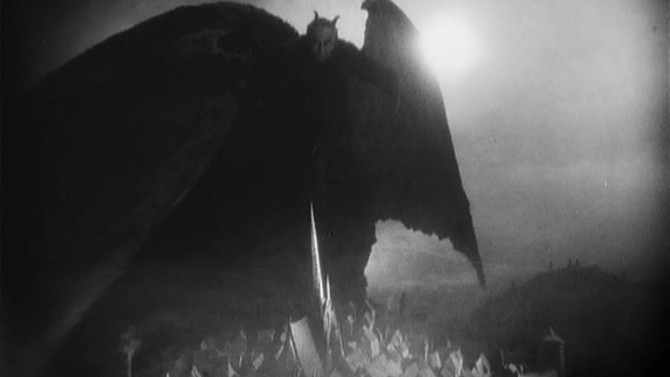
Soul Survivor?
FaustOctober 16, 2016Iconic German director F.W. Murnau is often considered to be one of the most influential filmmakers of the silent film era. Creating the first ever vampire movie, Nosferatu (a perfect example of German Expressionism) in 1922 and Sunrise (sometimes considered to be the best silent film drama of all-time – and the first motion picture he made in America) in 1927, a perhaps slightly lesser known movie (of his) that is equally as impressive is 1926's Faust: A German Folk Legend. Revolving around the age old struggle of good versus evil, the tale begins with the demon Mephisto (Emil Jannings) debating with an Archangel (Werner Fuetterer) about the nature of human beings. The agent of darkness believes that he will be able to corrupt the righteous, wise old sage Faust (Gösta Ekman). The two agree that, if Mephisto succeeds, the Devil will be given rule over the Earth.
-
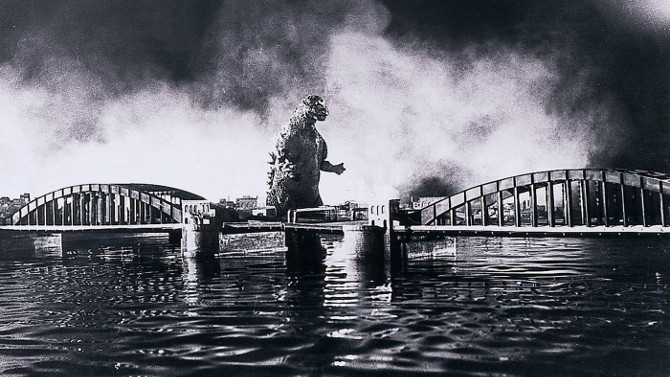
Go Go Godzilla
GodzillaOctober 13, 2016From a modern perspective, it may not be immediately recognizable that the classic 1954 monster movie Godzilla was, in many ways, a product of its time. Highlighting the anxiety of the nuclear age at the height of The Cold War, the gargantuan reptile first appears after a hydrogen bomb test in the middle of the ocean. Even this occurrence that starts off the film is based on reality, as the United States tested a giant nuclear weapon on March 1st, 1954, under the code name Castle Bravo. Fishermen, who were outside of the radius, were hit by the fallout from the blast, being covered with copious amounts of coral and radioactive ash. One man died following the event, creating an onslaught of international press that questioned these tests (though, other articles impugned the men on the vessel, suggesting that they were spies).

